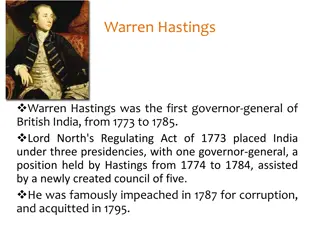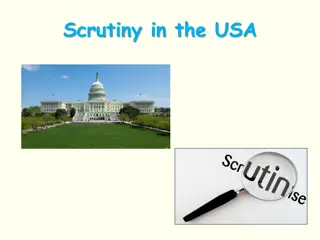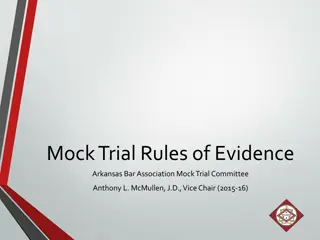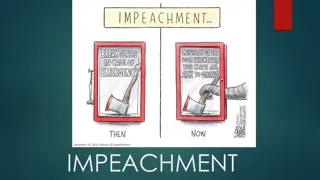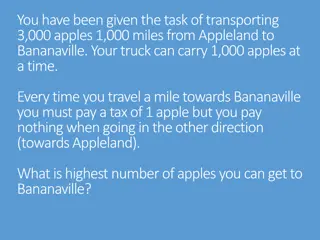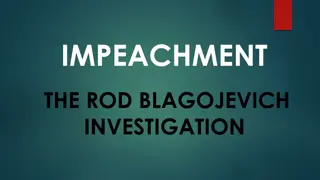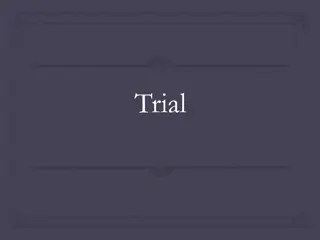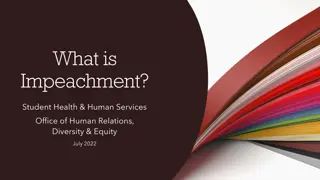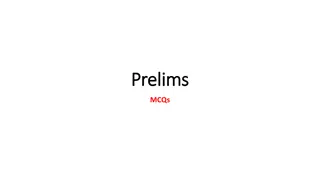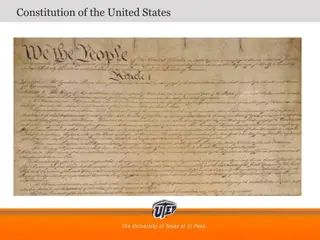Warren Hastings: First Governor-General of British India
Warren Hastings served as the first Governor-General of British India from 1773 to 1785. He introduced new laws, supported educational initiatives, and implemented reforms in areas such as judicial systems and revenue collection. Despite facing impeachment for alleged corruption, he was acquitted an
0 views • 17 slides
Government Scrutiny in the USA: A Comprehensive Overview
The scrutiny of the US government, much like the UK, primarily falls under the purview of the legislative branch, specifically Congress. This scrutiny involves investigation, oversight of the executive branch, and the power of impeachment. Congressional committees play a crucial role in scrutinizing
0 views • 10 slides
Understanding Mock Trial Rules of Evidence
Mock Trial Rules of Evidence are crucial for determining the admissibility of testimony and evidence in a trial setting. Students preparing for cases need to assess evidence admissibility, make timely objections, and be prepared to defend testimony. The rules cover objections, specific objections ty
0 views • 36 slides
Understanding Impeachment Process and President Trump's Accusations
Impeachment is a formal charge initiated in the House of Representatives, followed by a trial in the Senate. President Trump faced accusations for asking a favor from President Zelensky related to investigating Burisma Corporation and Hunter Biden. The process, historical context, and implications o
0 views • 14 slides
Analysis of Reconstruction Era Policies and Conflicts
The content discusses the challenges and conflicts during the Reconstruction era in the United States following the Civil War. It covers topics such as the presidency of Andrew Johnson, the actions of Radical Republicans, the impact of Black Codes on African Americans, and the conflict between Johns
0 views • 20 slides
Understanding Impeachment in the United States
Impeachment is a formal accusation of wrongdoing against a public official in the United States. This process involves the House of Representatives voting to impeach, with the Senate conducting the trial. It can apply to the President, Vice President, and civil officers for offenses such as treason,
0 views • 14 slides
Understanding the Trial Process in Court
Learn about the various stages of a trial, from pre-trial hearings to jury deliberations, including the roles of judges, attorneys, and witnesses. Explore concepts such as evidence presentation, impeachment, courtroom placement, scripted mock trials, and debriefing sessions. Dive into the difference
0 views • 7 slides
Understanding Impeachment Process in the United States
Impeachment is a tool provided by the US Constitution for Congress to punish serious misconduct by the president. The process begins in the House of Representatives and requires a two-thirds majority in the Senate for conviction. If convicted, the president is removed from office. Learn about the cr
0 views • 16 slides
Indian Constitution and Local Self-Government: MCQs from Various Years
This content provides multiple-choice questions (MCQs) related to local self-government and the Indian Constitution from various years. Questions cover topics such as Panchayati Raj systems, constitutional provisions, jurisdiction of courts, and impeachment procedures for Judges of the Supreme Court
0 views • 18 slides
Influence of the Iroquois Confederacy on the United States Constitution
The United States Constitution has roots in the Iroquois Confederacy's Great Law of Peace, shaping principles of governance like division of powers, impeachment processes, and restrictions on holding multiple offices. This influence is evident in the structure of branches, war powers clauses, and ba
0 views • 20 slides
